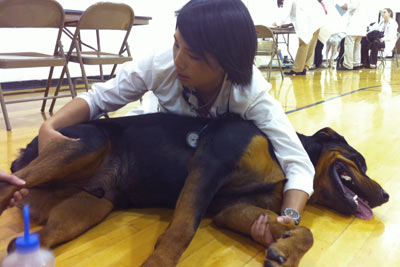Students to run vet clinic at Brooklyn YMCA May 5

On May 5, Cornell veterinary students and clinical faculty will join volunteer alumni to offer a daylong animal wellness clinic in Brooklyn at the Bedford-Stuyvesant YMCA.
The clinic, at 1121 Bedford Ave., will see large dogs 8-11 a.m. and noon to 3 p.m., and cats and small dogs (beagle-sized and smaller) 1-5 p.m. Pet visits will cost $20 per pet with all proceeds benefiting the YMCA. Owners will be required to present proof of rabies vaccination for all adult dogs and cats (animals over the age of four months).
The program is modeled after a veterinary program that's been running at Ithaca's Southside Community Center since 1996. Organized by Cornell parasitologist Dwight Bowman and veterinarians Daniel Fletcher and William Hornbuckle, the clinic allows first- and second-year veterinary students to hone skills that are used during typical wellness visits. During the clinic, students will perform wellness visits on pets that may not otherwise have access to veterinary care. Pets diagnosed with any clinical condition are referred to local veterinary practices for further diagnostics and follow-up.
With a passion for student-community engagement, Bowman, professor of parasitology, won for his efforts a Kaplan Family Distinguished Faculty Fellowship in Service Learning award in May 2011. The annual award honors two Cornell faculty members for making a significant impact on Cornell education by involving students in service learning. Bowman and Fletcher, assistant professor of clinical sciences, is using the $5,000 award to fund a clinic that was held in October in the Bronx and the upcoming clinic in Brooklyn.
"Students come to veterinary school to touch animals," said Bowman. "We wanted to give them that opportunity as soon as possible, so we developed a community practice training program that immediately allows students to make a difference. They handle everything from interacting with clients to examining patients. As supervisors we watch and assist only when needed, while older students mentor the younger students and manage the clinic. Bringing them to New York City will give us a chance to work and network with our many alumni in the area, begin interacting with New York City communities where need is great, and gain greater exposure."
Bowman and his colleagues are working to turn the service program into an official course in the veterinary curriculum's Community Practice Service rotation, offering credit to its student leaders. He hopes the clinic's expanding exposure and scope will help attract the funding needed to endow the program and ensure its future.
"My overarching goal is to develop the clinic's structure to a point where it will continue as a center of service learning," said Bowman. "We have a new crop of clinical staff devoting time to the project, and I am working to get them more involved with the Faculty Fellows in Service and the Public Service Center. Students continue to show phenomenal interest and participation, and their clientele is expanding. I hope to develop an infrastructure that allows these invaluable interactions to grow."
"This remarkable Ithaca-Cornell collaboration teaches students the value of volunteer service, augments their curriculum through practical, hands-on training and engages students, faculty, community leaders and local veterinarians in an effort that enriches the lives of the most needy individuals in our community," said Michael Kotlikoff, the Austin O. Hooey Dean of Veterinary Medicine. "Not only does Dr. Bowman volunteer endless hours to the organization of the clinic, he tirelessly raises funds, negotiates voluntary drug and vaccine donations form pharmaceutical companies, and obtains equipment and supplies for the program. His efforts exemplify the spirit of Cornell and have established a unique learning model in veterinary medicine."
Media Contact
Get Cornell news delivered right to your inbox.
Subscribe